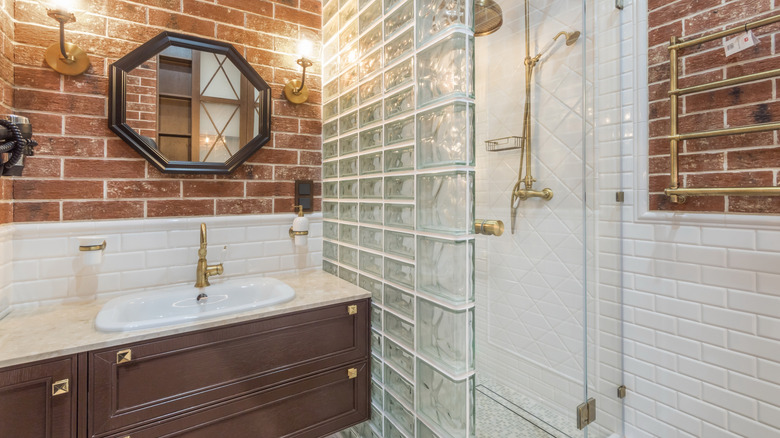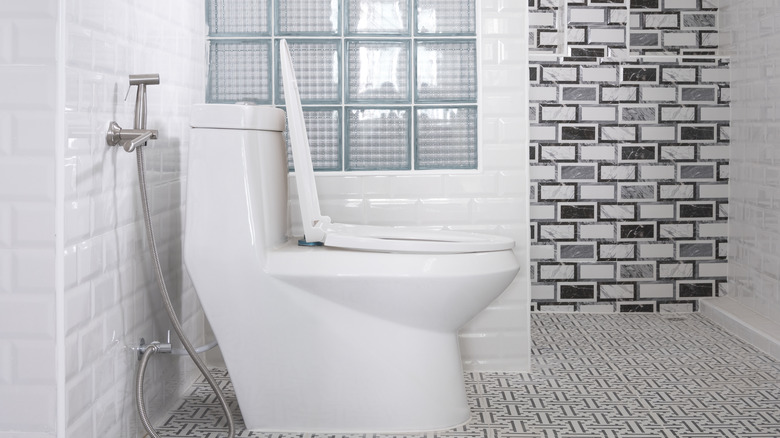Are DIY Glass Brick Showers Reliably Strong?
The fact that glass block showers have been around forever — or at least since the early twentieth century — tells you two things. Glass blocks aren't out of style (though some say they're one of the bathroom trends that are completely outdated). And since so many have survived for so long, they must be reliable and strong. But does that apply to DIY glass brick installations as well? House Digest spoke exclusively with Kevin Keen, construction expert, contractor, and owner of Keen's Buildings, to find out.
"With thoughtful design and the right materials, a glass brick shower can be stylish, durable, and budget-friendly," Keen said. But since installation can be tricky and the stakes are high, DIYers should get a handle on the intricacies of glass block installation before committing. The mortar joints can crack and separate over time, Keen said, and joints that aren't properly sealed can lead to water leakage. "If that happens, water can work its way through and damage drywall, framing, or subflooring behind the wall."
Water intrusion in a wall that's specifically meant to prevent water intrusion is obviously and always unwelcome, and potentially catastrophic, so there's a baseline of installation quality that must be met. "Above all, don't cut corners on waterproofing materials or structural reinforcement," Keen said. "Spending a little extra on a proper base, anchoring, and waterproof membrane will save thousands in potential repairs later."
Joints and framing are key for a durable glass block installation
How strong and reliable a DIY glass block shower will be depends on how they're built. There are more moving parts here than you might think, and if all goes well none of them will be moving. When House Digest talked exclusively with contractor and construction expert Kevin Keen, he explained that the potential difficulty isn't with the qualities of the material itself, but with the specifics of the installation. "Glass blocks themselves are durable and can stand up to daily use without issue," Keen said, "but the weak points are usually the joints and the base." Everything must be perfectly leveled, strongly anchored, and properly bonded and sealed to minimize the risk of the bricks moving or even breaking over time. The smallest misalignment can lead to cracks and leaks.
Glass blocks are fixed in place with steel rods or metal anchors tied to the room's framing, protecting the wall against movement from temperature-related expansion and contraction, as well as from the usual vibrations present in any home. Joints are made using a specialized waterproof mortar. "It's also essential to install a waterproof membrane or vapor barrier behind the wall, just as you would with tile," Keen explained. "This secondary protection ensures that if any water does make it through, it won't reach the framing."
The importance of every aspect of a sound glass brick installation can't be overstated. "Even a slow leak can cause mold growth and hidden deterioration," he said, adding that "regular inspection and resealing of perimeter joints every few years will also help prevent long-term water issues."
Glass bricks need the proper support
While DIY glass brick showers are a simple way to add character to your bathroom, like just about everything else, things are more complicated than they might first appear. And when it comes to homebuilding and renovation, one must always be aware of what's going on behind one's walls and under one's floors. Kevin Keen told House Digest in an exclusive interview that weight is a big concern when it comes to glass blocks. "Glass brick showers are visually striking, but they come with practical considerations, one of which is weight," he said. "Glass block walls are considerably heavier than tile or acrylic panels, so the supporting floor must be able to handle the load."
It's critical to verify that the framing of any home can support the additional load represented by a glass brick shower. Older homes come with older materials and were usually built with outdated standards. Verifying that your framing can handle the load is also critical for upper-floor installations, Keen said. There's a possible silver lining in this if a DIYer has experience with remodeling and framing. He explained, "If a homeowner wants to save on labor, they could handle the surrounding framing and finish work while leaving the panel installation to a professional."
DIYers should opt for pre-fab glass panels
In addition to handling any necessary framing, there are other ways a DIYer can save money on a glass block shower installation. In our exclusive conversation with construction expert Kevin Keen, he told House Digest that homeowners should consider using glass block panel systems that are pre-assembled. Installation is easier, but they have the same look. This is a great way to minimize the risks of a traditional installation.
Setting mortar puts time-pressure on the installer, since making after-the-fact adjustments is a challenge. This, along with the sheer difficulty of the masonry work, can lead to flaws, which can in turn lead to leaks and cracks. "For someone with solid experience in masonry or tile work, building a glass brick shower can be done, but it's not an easy project," he added. These panels are faster to install, cheaper than custom installations, and reduce waste.
Prefab panels point to another way homeowners can contribute to a more successful DIY installation. "If the goal is to keep costs down while achieving the glass brick look, simplicity is key," Keen said. "A single straight wall or corner enclosure will be much more affordable than a curved or freestanding design." And get inventive. Just as you can use glass brick for an interior window or to create a partition wall for your entryway, you can mix things up in the bathroom as well. "For instance, use a glass block for one feature wall and finish the rest of the shower with tile or acrylic panels," Keen explained. "That creates visual interest without driving up costs."



